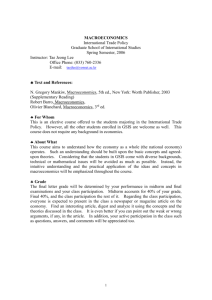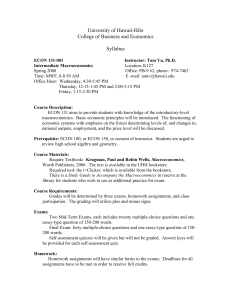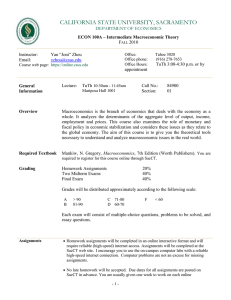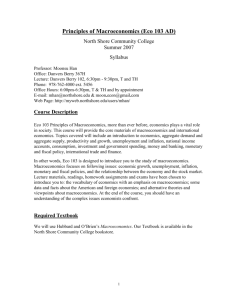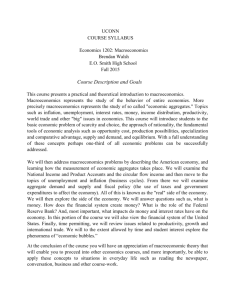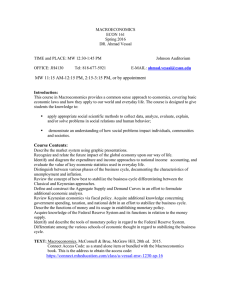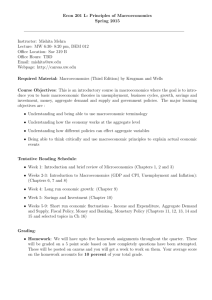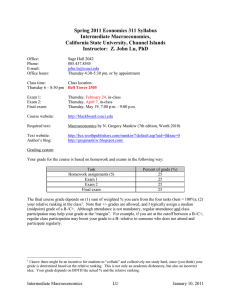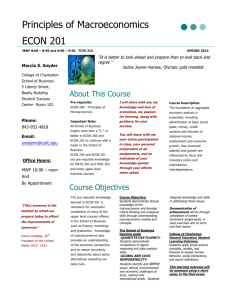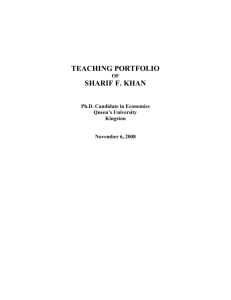ECON 202 (3) - Courses | Faculty of Land and Food Systems
advertisement
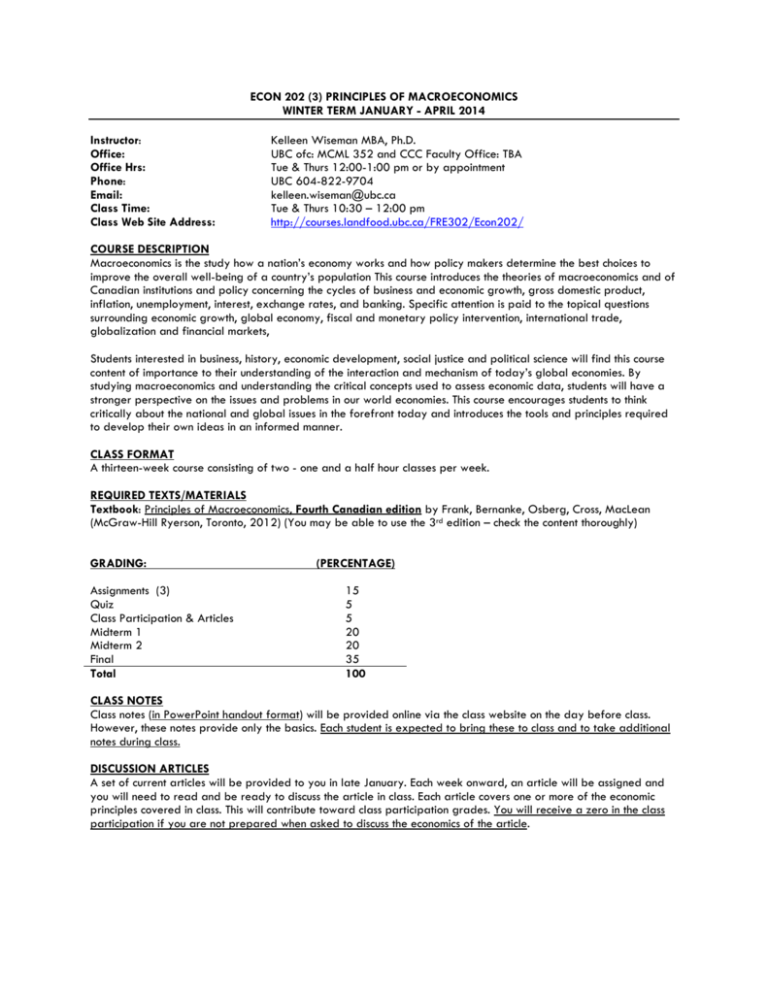
ECON 202 (3) PRINCIPLES OF MACROECONOMICS WINTER TERM JANUARY - APRIL 2014 Instructor: Office: Office Hrs: Phone: Email: Class Time: Class Web Site Address: Kelleen Wiseman MBA, Ph.D. UBC ofc: MCML 352 and CCC Faculty Office: TBA Tue & Thurs 12:00-1:00 pm or by appointment UBC 604-822-9704 kelleen.wiseman@ubc.ca Tue & Thurs 10:30 – 12:00 pm http://courses.landfood.ubc.ca/FRE302/Econ202/ COURSE DESCRIPTION Macroeconomics is the study how a nation’s economy works and how policy makers determine the best choices to improve the overall well-being of a country’s population This course introduces the theories of macroeconomics and of Canadian institutions and policy concerning the cycles of business and economic growth, gross domestic product, inflation, unemployment, interest, exchange rates, and banking. Specific attention is paid to the topical questions surrounding economic growth, global economy, fiscal and monetary policy intervention, international trade, globalization and financial markets, Students interested in business, history, economic development, social justice and political science will find this course content of importance to their understanding of the interaction and mechanism of today’s global economies. By studying macroeconomics and understanding the critical concepts used to assess economic data, students will have a stronger perspective on the issues and problems in our world economies. This course encourages students to think critically about the national and global issues in the forefront today and introduces the tools and principles required to develop their own ideas in an informed manner. CLASS FORMAT A thirteen-week course consisting of two - one and a half hour classes per week. REQUIRED TEXTS/MATERIALS Textbook: Principles of Macroeconomics, Fourth Canadian edition by Frank, Bernanke, Osberg, Cross, MacLean (McGraw-Hill Ryerson, Toronto, 2012) (You may be able to use the 3rd edition – check the content thoroughly) GRADING: Assignments (3) Quiz Class Participation & Articles Midterm 1 Midterm 2 Final Total (PERCENTAGE) 15 5 5 20 20 35 100 CLASS NOTES Class notes (in PowerPoint handout format) will be provided online via the class website on the day before class. However, these notes provide only the basics. Each student is expected to bring these to class and to take additional notes during class. DISCUSSION ARTICLES A set of current articles will be provided to you in late January. Each week onward, an article will be assigned and you will need to read and be ready to discuss the article in class. Each article covers one or more of the economic principles covered in class. This will contribute toward class participation grades. You will receive a zero in the class participation if you are not prepared when asked to discuss the economics of the article. CLASS POLICIES Late assignments: In fairness to students who work hard to meet course deadlines, late assignments will not be accepted. Assignments must be stapled, neatly written or typed, and have solutions provided in the correct order. Assignments are due at the beginning of class. Messy assignments will not be accepted. Plagiarism or Cheating: Plagiarism is the use of the language, ideas or thoughts of another without acknowledgement. It is a serious offence, which, like other forms of cheating, incurs severe penalties. You are encouraged to work together in the assignments but you must submit an individual assignment. The penalty for cheating or plagiarism is at the very least, a mark of zero. It may even result in a failed grade or expulsion from the College. Students are advised to familiarize themselves with the rules of practice and conduct concerning the writing of papers and examinations, in order to avoid such dishonesty. Attendance: Attendance will be taken at the beginning of class and will be considered in the raising and lowering of borderline grades. Please notify me as soon as possible if you are unable to attend class. Students must provide documentary evidence (such as a doctor's note) in order to make up an assignment or exam missed due to emergency circumstances. It is your responsibility to let me know if you have come in late and have missed attendance. Students are advised to familiarize themselves CCC attendance policy. Exams: Midterm exams will be written on the days noted in the schedule. Calculators are required. However, only a very basic calculator is allowed during the exam. No calculators with storage, memory or translation functions are allowed. No other papers are allowed in the exam for any reason. Failure to comply with the policy may result in a zero on the exam. STUDENT RESPONSIBILITIES Economics is not a subject most people can easily grasp by simply attending class and reading occasional chapters. Cramming" before exams rarely works. You need to read assigned materials and complete assigned questions regularly week by week. Ignoring the text and the student guide is a high-risk decision. Very few people can earn the grade they are capable of without doing all the work. Class notes are not a repeat of the text - they provide additional examples and contextual information. In order to make the class more applicable and interactive you will need to commit to reading text chapters and completing inclass questions prior to class. Each student is responsible for the following: reading the assigned textbook material before each class; downloading notes from the website and bringing them to class; taking additional notes in class; attending & participating in class; reading assigned articles and participating in class discussions; reviewing and completing end of chapter questions from the text; and completing quizzes, exams & assignments as required and on-time. CLASS PROTOCOL Laptops are not necessary in the classroom. If you are using a laptop, you must to sit in the back row because it is distracting for others to have screens available for viewing. Please respect others and the instructor by focusing/engaging in the lecture material and not chatting. Do not enter and exit during the class. The class is one hour and twenty minutes long and you are expected to be in the class the entire time. No eating during class. Be on time for class. If you are late, enter the classroom quietly. TIPS ON HOW TO STUDY FOR ECONOMICS Read the chapter before class so you can genuinely follow and increase your understanding of the class material Print out the class notes and bring them to class. Add your own notes, examples, and note important topics. Read the business section of any newspaper so you can apply the economics to the real world. CLASS OUTLINE Week Week 1 Week 2 Date Jan 7 Jan 14 Week 3 Jan 21 Week 4 Jan 28 Week 5 Feb 4 Week 6 Feb 11 Feb 17 Topic INTRODUCTION Thinking Like an Economist What is Macroeconomics? BACKGROUND Supply and Demand: Micro to Macro Economics Macro and Micro Elements: Shifting & Moving along Supply & Demand Curves Equilibrium & Price Effects in the Economy: Aggregate demand & Aggregate Supply BIG PICTURE Macroeconomics: The Big Picture: Players, Structures & Measurement Measurement: Financial Indicators- GDP, Unemployment, Inflation & More Economic Growth, Productivity, and Living Standards: Measurement & Linkages between the Economy & Standard of Living Economic Fluctuations: Recessions, Depressions, Expansion, & Stagflation Macroeconomic Models: The Basics & Examples MIDTERM EXAM 1 Feb 11 THE IMPORTANCE OF POLICY Monetary, Fiscal, & Structural Policy Central Bank: Role and Policy Week 12 April 1 Week 13 April 8 Financial Markets and International Capital Flows Feb 25 Week 8 March 4 Week 9 March 11 Week 10 March 18 Week 11 March 25 1 3 4 4,5,6 14 7 9, 9A, 10 Reading Week Government: Role and Policy Effect of Policy: How?/Why? Keynes Model MACROECONOMIC MODELS Models to Review Policy and Effects on the Economy: Keynesian Model Revisited Aggregate Demand – Aggregate Supply Model Aggregate Demand – Inflation Adjustment Model Policy Reaction Functions Multipliers MIDTERM EXAM 2 March 18 TRADE & GLOBALIZATION International Trade and Trade Policy Comparative Advantage & Opportunity Cost Globalization Policy: Tariff, Quotas, Protectionism Exchange Rate Agencies & Agreements Trade Deficits and Balance FINANCIAL MARKETS Saving and Capital Formation Week 7 Chapter(s) from Text FINAL EXAM See CCC Final Exam Schedule 8 8 11 12 2 15 13 16 16
